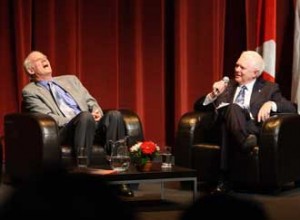
Kyoto Prize laureates light up Moyse Hall stage
By Chris Chipello
On May 7, 1959, British novelist and physicist C.P. Snow delivered a high-profile lecture at the University of Cambridge, in which he decried a growing communication gap between “the two cultures” of science and the humanities.
Fifty years later, that lecture – and the widespread debate that it spawned – was the focus of a public conversation at McGill between the two Canadian winners of the prestigious Kyoto Prize: Prof. Emeritus Charles Taylor, a philosopher known for his work on modernity and multiculturalism, and University of Toronto Prof. Anthony Pawson, whose scientific discoveries have transformed understanding of the way cells work in health and in disease.
In his essay, Snow argued that the rift between the two cultures “represented the major hindrance to solving the world’s problems,” noted Provost Anthony C. Masi, in kicking off the May 5 event at Moyse Hall. “To address the divide between the ‘two cultures,’ Snow was unambiguous: the only solution is education.”
That theme is in keeping with the Kyoto Prize’s philosophy of balancing scientific progress with spiritual depth, said Toyomi Inamori, Senior Managing Director of the Inamori Foundation, which established the prize in 1985. The award, often described as Japan’s equivalent to the Nobel Prize, honours individuals who have contributed significantly to the scientific, cultural and spiritual betterment of humankind.
Following are excerpts from the discussion between Prof. Taylor, the 2008 Kyoto Prize winner in Arts and Philosophy, and Dr. Pawson, the 2008 winner in Basic Sciences. Prof. Antonia Maioni, Director of the McGill Institute for the Study of Canada, moderated the forum.
Maioni: Snow says universities need to encourage a new scientific class to allow science to come up with the solutions needed for the world’s problems. Can science save us?
Pawson: To the contrary of saving us, I think, science and its sibling, technology, create great problems. And the question is: Can we avoid those problems by simply not doing science, by denying our creativity? Or do we need more science to overcome those problems? And, particularly, can the fusion or the synergy between science and humanities be a way forward? … Science, as always with human creativity, is going to cause problems, and then we have to figure a way out of the problems.
Taylor: And we can’t stop the creativity without totally mutilating ourselves…
Maioni: One of the criticisms of Snow is (his) simplistic rendering of these two cultures. Is it possible that it was just based on a moment in time?
Taylor: Well, I think it was based on a moment in time, because of certain features in the intellectual world of his time – because I don’t think those kind of attitudes are common today … What isn’t in that moment of time is that whole problem of bringing to bear all these resources – both in the different sciences and the different humanities – bringing them to bear on these problems.
Pawson: To my mind there is an underlying similarity between science and humanities, which is just the creative endeavor. If you talk to a scientist about the moment of discovery, I don’t think it’s any different from a writer or a musician … So science is not the dry discovery of facts. It’s this sort of wonderful explosion of sense of euphoria … What is slightly different is that an artist creates something that’s really unique. If Oscar Wilde had not written The Importance of Being Earnest, no one else would have written it. Whereas a scientist in a sense discovers what already exists … And I think what’s also different about science is there comes a point where we can say something is true, the laws of thermodynamics are true – gravity works in a particular way … I mean we can measure these things and that’s the way it is. And your opinion about it really doesn’t matter … And that I think is where you get something not of a clash of cultures, but a difficulty of understanding.
Maioni: In the university context, is hyper-specialization somehow making that rift
even deeper and perhaps multiplying it across many different areas?
Taylor: On one side, I think that our whole manner of giving people their qualifications and giving them the chance of getting a job, pushes people to more narrow specialization … What pushes the other way is that all the really interesting issues usually transcend these specializations. There’s a kind of pull constantly going back and forth. And really our graduate students have to navigate some very difficult issues.
Pawson: Certainly if you think about the sciences for example, you really have to focus on one particular thing to really discover something new. But then that new discovery, if it’s important, will inform a whole realm of ideas.
Maioni: We’re in an Internet age. Have we come to a common culture of learning, which I think is something that Snow was hoping for – that we would all know the laws of physics and logic of philosophers?
Taylor: I think the present Internet age could work tremendously effectively – even the blogosphere could work – to spread understanding on the part of nonspecialists. It’s the nearest thing to the kind of common culture that C.P. Snow wanted … not that everybody could be a polymath, but that they could have enough of a grasp of what’s going on elsewhere to be able intelligently to discuss common issues.
Pawson: From one generation to another, genetically we’re pretty similar. But our brains are incredibly plastic – so in each generation our brains our wired somewhat differently because of the different cultures that we grew up in … The kids growing today have from the day they were born lived in this age of doing multiple things, being highly connected … I think actually it’s extremely promising; I’m very excited.
